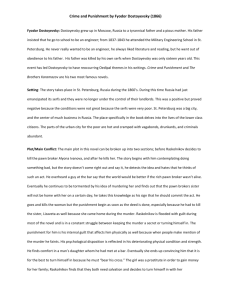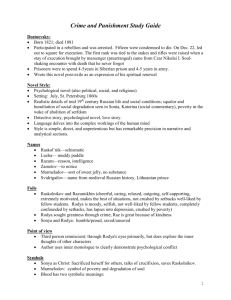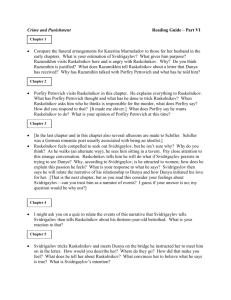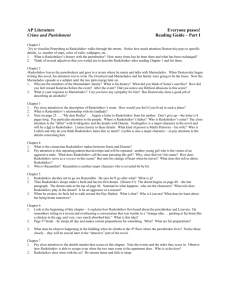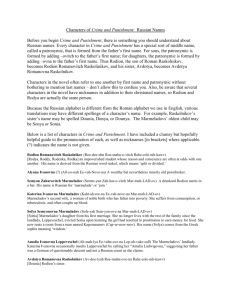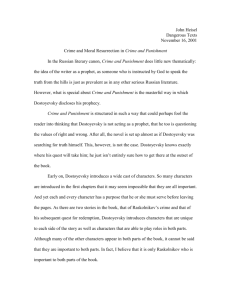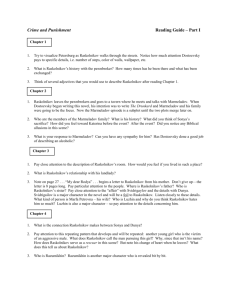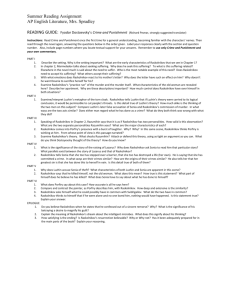crime and punishment blog greatest hits.doc
advertisement
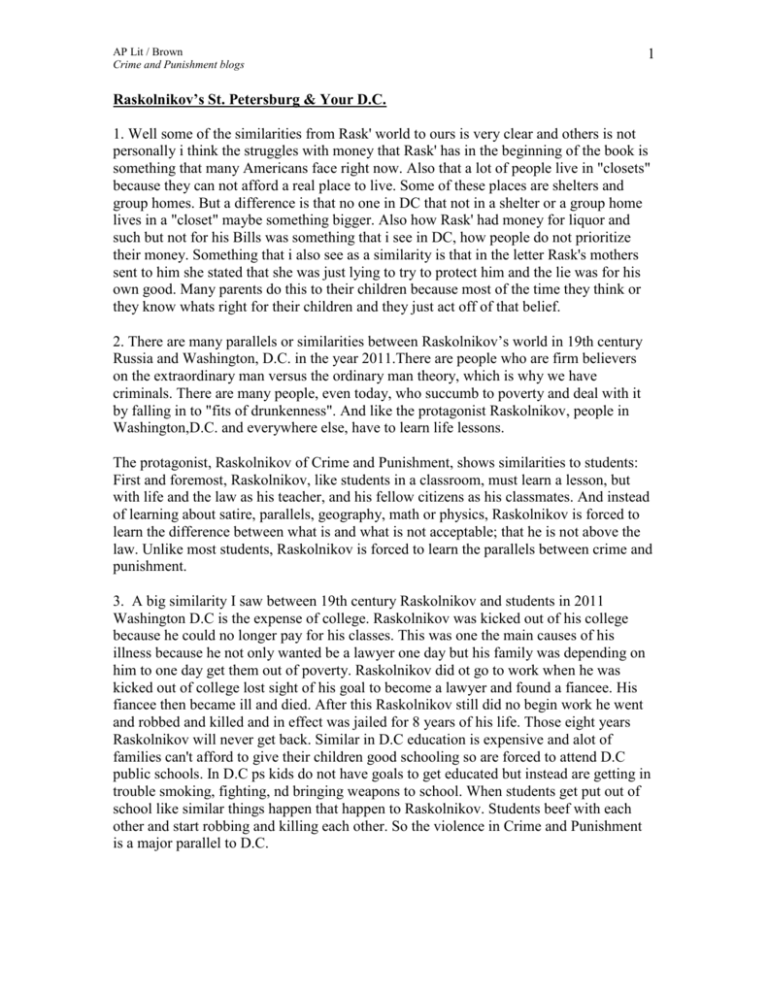
AP Lit / Brown Crime and Punishment blogs 1 Raskolnikov’s St. Petersburg & Your D.C. 1. Well some of the similarities from Rask' world to ours is very clear and others is not personally i think the struggles with money that Rask' has in the beginning of the book is something that many Americans face right now. Also that a lot of people live in "closets" because they can not afford a real place to live. Some of these places are shelters and group homes. But a difference is that no one in DC that not in a shelter or a group home lives in a "closet" maybe something bigger. Also how Rask' had money for liquor and such but not for his Bills was something that i see in DC, how people do not prioritize their money. Something that i also see as a similarity is that in the letter Rask's mothers sent to him she stated that she was just lying to try to protect him and the lie was for his own good. Many parents do this to their children because most of the time they think or they know whats right for their children and they just act off of that belief. 2. There are many parallels or similarities between Raskolnikov’s world in 19th century Russia and Washington, D.C. in the year 2011.There are people who are firm believers on the extraordinary man versus the ordinary man theory, which is why we have criminals. There are many people, even today, who succumb to poverty and deal with it by falling in to "fits of drunkenness". And like the protagonist Raskolnikov, people in Washington,D.C. and everywhere else, have to learn life lessons. The protagonist, Raskolnikov of Crime and Punishment, shows similarities to students: First and foremost, Raskolnikov, like students in a classroom, must learn a lesson, but with life and the law as his teacher, and his fellow citizens as his classmates. And instead of learning about satire, parallels, geography, math or physics, Raskolnikov is forced to learn the difference between what is and what is not acceptable; that he is not above the law. Unlike most students, Raskolnikov is forced to learn the parallels between crime and punishment. 3. A big similarity I saw between 19th century Raskolnikov and students in 2011 Washington D.C is the expense of college. Raskolnikov was kicked out of his college because he could no longer pay for his classes. This was one the main causes of his illness because he not only wanted be a lawyer one day but his family was depending on him to one day get them out of poverty. Raskolnikov did ot go to work when he was kicked out of college lost sight of his goal to become a lawyer and found a fiancee. His fiancee then became ill and died. After this Raskolnikov still did no begin work he went and robbed and killed and in effect was jailed for 8 years of his life. Those eight years Raskolnikov will never get back. Similar in D.C education is expensive and alot of families can't afford to give their children good schooling so are forced to attend D.C public schools. In D.C ps kids do not have goals to get educated but instead are getting in trouble smoking, fighting, nd bringing weapons to school. When students get put out of school like similar things happen that happen to Raskolnikov. Students beef with each other and start robbing and killing each other. So the violence in Crime and Punishment is a major parallel to D.C. AP Lit / Brown Crime and Punishment blogs 2 4. I think that a reason people seemed to actually "think" more was because of the lack of modern technology. Back then people weren't used to having immediate results so they had time to really deliberate and decide on their actions. Now people usually go with whatever comes first because it's usually faster. We've gotten so impatient that we tend to go off impulses and act before we think, like Brittney said. Also they walk a lot too. Why didn’t Raskolnikov spend the stolen money? 5. He stole the money , right? If he stole money and didnt use it than somehthing got in the way of it. Im not sure if its pride , giult or what? BUT if someone steals money, their first intentions and thoughts is wondering what they are going to buy. For Rassy Ras not to spend the money doesnt make him more or less guilty. He stole thats the initial crime. Regardless if he spends the money or not , he STOLE it. Im still clueless as to why he didnt spend the money , but i know Mr.Brown will be happy to explain it to me when we get to school :) 6. I think that the reason Raskolnikov didn't use the money was because deep down it was a pride issue. It was hard for him to admit that he wasn't one of the elites or supermen (i think that's what he called them). He knew that deep down he was no Napoleon, able to commit crimes for a greater purpose and not feel bad about it, but I feel that deep down, by not taking the money, he's trying to say, "I accept the fact not I'm not an elite (superman), but I'm better than the average person and will not commit a crime for something as small as petty cash." By not using the money Raskolnikov tried to create an image of himself that was still better than the average person. Either that or he was so busy trying to not get caught for the murder it slipped his mind. I totally forgot about the money until like the last part of the book. Is Raskolnikov a villain? 7. Raskolnkov is a villain because he became a thief and a murderer all in the same day. However, he ended up being the only one with heart because he was incredibly guilty about his wrongdoings, thus making him incredibly ill, healthwise and mood-wise to his own friends and family who were trying to show him love. Svidrigailov also poisoned his own wife, but ended up being a sorry excuse for a villain - a cowardly one, at that - by killing himself. Even his disrespect towards Dunya, denouncing her as if she were just some whore by blackmailing her own brother just to get sex from her. And then there's Luzchin because he's accused Dunya of theivery and decieving her and her mother into thinking that he'd actually care about them and help them. The real criminal would have to be Svidrigailov. I don't think it was true guilt that lead to his death. I think it was simply fear of what would happen when he was to be caught and tried for his crimes. The only person who would've truly been guilty was Raskolnikov and that was completely obvious throughout the entire story. AP Lit / Brown Crime and Punishment blogs 3 What role does chance and/or coinicidence play in Crime and Punishment? 8. It depends on what you call chance and coincidence. Each one can be used in every situation in the book. But I will that it was a coincidence that Raskolnikov was in the same area as Lizaveta that night, but it was by chance that he overheard that Alyona Ivanovna would be at home alone. It was a coincidence that Raskolnikov's landlady had an axe but it was chance that it was in the caretaker's shed. But either way you put it it could still be right. But I'll go this way: where there could be logical explanation behind everything, like Raskolnikov actually killing Alyona Ivanovna, it could be coincidence, but the series of events that led to Raskolnikov ending up with Sonia, which were kinda too convenient, I'll say that it was chance. I think Dostoevsky might've gone over a bit too much to make things work. Not so much that it's unbelievable, but just enough for you to doubt it really happening for just a second and then just roll with the story. There's no real harm done to the overall plot of the story. How does Dostoyevsky achieve suspense in the novel? 9. Dostoyevsky achieve suspense in this novel with the discriptive thoughts of Raskolnikov. When Raskolnikov found out about his sister getting married in a hurry he immidiately assumed the worst after that long letter from his mother telling him not to worry. Raskolnikov stoms out his apartment and heads towards Razkumikhin house for no apparent reason. While walking Raskolnikov has hundreds off thoughs going through his mind but, yet still manages to save a girl from being taken advantage of again. The spontaneous actions of Raskolnikov is what sustains the suspense in Dostoevsky's novel. A very suspenseful scene is when Raskolnikov goes to kill the old women. Again Raskolnikov has hundreds of thoughts going through his head but he is not sitting and thinking he is acting and thinking. Raskolnikov kills the old ladies step sister, who was a nice women thinking of everything except the fact that he was about to kill another person. This novel has a lot of Raskolnkov's long inner thoughts but, the long descriptions is what keeps the suspense. What can we make of Raskolnikov’s “extraordinary man” theory? 10. Raskolnikov sees himself as an “extraordinary man,” a person who is extraordinary and, therefore, above the rules and laws that govern the rest of society, or the "ordinary man." Raskolnikov' uses his theory of the extraordinary man versus the ordinary man to justify the murders that he commits. Because of this theory, Raskolnikov believes that he is better than the rest of society. Raskolnikov exercises his belief in this theory, first by alienating himself from the rest of society, then by committing mass murders. Dostoyevsky's attitude towards this theory comes into play after Raskolnikov commits the murders. Dostoyevsky disproves this theory by showing the psychological torture that ensues after Raskolnikov commits the murders. Raskolnikov experiences a whirlwind of emotions, namely guilt, which force him into confession and land him in jail, where he finds solace, and realizes that he is not exempt from the rules that govern society; he is a part of society. Modern-day examples of this theory put into practice include criminals. AP Lit / Brown Crime and Punishment blogs 4 What are your thoughts on the female characters: Sonya, Dunya, Katerina Ivanovna, and Raskolnikov's mom? 11. Dunya is a well rounded character. Dunya is a strong woman who could take care of herself. Dunya had to get through work with Svidrigailov forcing himself and his money upon her even though she constantly rejected him. Svidrigailov's wife did not know the truth and slandered Dunya's name to the whole town. After Dunya's name was slandered she was shunned by the towns people but she stayed strong. Dunya also had to deal with her brothers illness. When Dunya and her mother came to Petersberg and visited her brother he pushed them away. Dunya loved her brother with all her heart and planned to marrying Luzchin with him in mind but he was not happ to see her or about the marriage but she stayed strong. She conforted her heart broken mother and waited for her brother to come to his senses. Dunya stayed true to her brother and saw through the evil in Luzchin and that he did not respect him so she dismissed Luzchin. Dunya also went to meet Svidrigailov by herself and she knew he was a murderer. And when Svidrigailov ried to force himself upon Dunya again she tried to shoot him but couldn't go through with it but continued to tell him no and he let her go. Dunya was the strongest and helped all the other women get through Raskolnikov's illness Why does Raskolnikov reject the kindness of others for so long? 12. Guilt accompanied with the fact that Rasko thinks he is better than everyone else or "extraordinary." I think that Rasko. rejects his family and solace for two reasons. The first reason is that his sister is happy and getting married and doing better than Rasko both socially and financially. These feeling that Rasko is a lesser being is one that he does not like feeling and that probably is why he rejected the kindness of his family. The second reason is that he wants to feel powerful and the family and not knowing who his sister is marrying probably makes him feel weak or not appreciated. Rasko probably wanted to give his sister his blessing himself. Analyze Dostoyevsky’s complex characterization of Raskolnikov 13. Rask is a very interesting character. He is a combination of today's society all in one. One minute he is giving the last of his money to someone or helping a drunk teenager in the park. Then, he can create this rage of anger and be ready to just get anyone in his path that has hurt him. Mentally he is not stable. If he knew he killed someone (with an axe), then why wouldn't he NOT have any blood on him or his clothing? That moment still bothers me in the book. Really, Rask? I hope today's society doesn't have any more Rasks. But, if they do I will try my best not to get on his bad side. 14. I think that Dostoyevsky is trying to put every personality into one person, Raskolnikov. In doing so Raskolnikov has many emotions during his illness. In doing so he can that Raskolnikov is a good person at heart but has a bad side. For example Raskolnikov pushes Razumikhin away when he tries to help him through his illness but Raskolnikov is very cruel to his friend. But Raskolnikov also trust him to watch over his family and accepts him as a brother and good enough to marry his sister. Raskolnikov also speaks very highly of Razumikhin through out the novel. This the best qualities in Raskolnikov as well as the worst in him.
